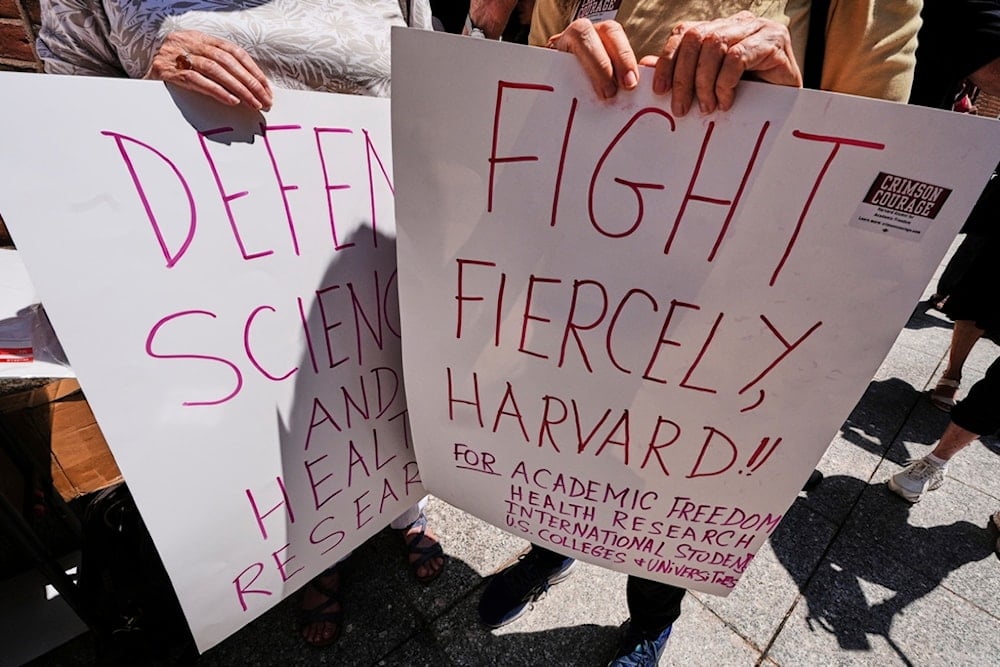Trump admin launches review of Harvard patents, threatening takeover
The Trump administration is reviewing Harvard’s federally funded patents under the Bayh-Dole Act, threatening government takeover if violations are found.
-

Protestors gather outside the Moakley Federal Courthouse, where Harvard University appeared to challenge $2.6 billion in funding cuts by the Trump administration, Monday, July 21, 2025, in Boston, Massachusetts (AP)
The Trump administration is moving to challenge Harvard University’s control over patents derived from federally funded research, in a sharp escalation of tensions between the White House and one of the country’s most prominent academic institutions, Politico reported on Friday.
Commerce Secretary Howard Lutnick announced that the administration had launched an immediate review of Harvard’s intellectual property portfolio under the Bayh-Dole Act of 1980, which allows the federal government to claim ownership or license patents if universities fail to meet certain obligations.
In a letter to Harvard President Alan Garber obtained by Politico, Lutnick said the review will examine whether the university has complied with federal disclosure, manufacturing, and commercialization requirements. If violations are found, the government could take over patents or grant licenses to third parties.
“The Department places immense value on the groundbreaking scientific and technological advancements that emerge from the government’s partnerships with institutions like Harvard,” Lutnick wrote. “However, this privilege carries with it a critical responsibility… to ensure that intellectual property derived from federal funding aligns with the Bayh-Dole Act and maximizes the benefits to the American public.”
'Unprecedented retaliatory effort'
Harvard strongly rejected the move, calling it “an unprecedented retaliatory effort” in response to the university’s defense of its rights. A spokesperson said Harvard remains committed to full compliance with the Bayh-Dole Act and to ensuring public access to innovations stemming from federally funded research.
The confrontation builds on expanded federal powers enacted during Trump’s first presidency. In 2018, regulators removed a time limit on the government’s ability to seize ownership of inventions when disclosure rules are not followed.
The Commerce Department has given Harvard until September 5 to submit a complete list of patents derived from federal research grants, along with documentation proving compliance with all relevant laws and contractual obligations.
Harvard sues Trump over funding
Harvard University filed a lawsuit in April challenging the actions of the Trump administration's funding cuts, aiming to block efforts to reduce the university’s access to federal support.
The lawsuit alleges that the administration’s decision to withdraw financial backing jeopardizes academic independence and violates constitutional rights.
According to the lawsuit, the US government’s actions threaten essential research conducted on Harvard’s campus and form part of a broader attempt to penalize the institution for defending its legal rights.
The complaint emphasizes that federal funding is vital for "lifesaving and pathbreaking research" at the university.
On Monday, The Wall Street Journal reported that the Trump administration plans to cut an additional $1 billion in Harvard state funding. The move follows Harvard’s refusal to implement staffing and educational policy changes demanded by the White House.
Trump administration links cuts to antisemitism and policy refusals
The Trump administration has cracked down on higher education institutions following last year's pro-Palestine protests, with administration officials framing the issue as a means to tackle "antisemitism". In response, Harvard stated that it is actively addressing antisemitism but will not compromise on its commitment to uphold freedom of speech in universities.
Harvard rejected the assertion that it tolerates antisemitism and emphasized that any steps taken to combat discrimination must not infringe on constitutional protections.
The university maintains that defending freedom of speech is a core principle of its educational mission.
Earlier, the US Department of Education announced the withdrawal of $2.2 billion in state funding from Harvard after university leaders publicly declined to follow the White House’s policy demands. Trump also questioned whether Harvard should retain tax benefits granted to educational institutions.
Moreover, Trump labeled Harvard University a “joke” and called for the prestigious institution to lose its federal research funding after it rejected demands for external political oversight.

 4 Min Read
4 Min Read










